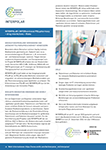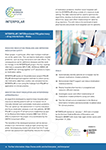
About INTERPOLAR
Reducing medication problems and improving medication safety
Especially older people often take multiple medications at the same time. This can lead to medication-related problems such as adverse drug interactions and side effects. Consequences can be additional disease patterns and further need for treatment. Medication-related problems are often underestimated and are often the cause of morbidity and mortality in hospitalized patients. In the cross-consortium use case INTERPOLAR, the four medical informatics consortia DIFUTURE, HiGHmed, MIRACUM and SMITH are working together to develop IT solutions to improve medication safety. The project is coordinated by the SMITH Consortium Office.

INTERPOLAR Use Case
Development of an IT-based identification of patients with an increased risk of drug-related problems
Targeted and resource-saving deployment of hospital pharmacists
Investigation of cause-effect relationships of drug-related problems using data from routine care
Cross-consortium project of the Medical Informatics Initiative involving 20 partners from science, research and healthcare, including 15 university hospitals and one associated partner
Identification of risky medication – Targeted intervention
The INTERPOLAR Use Case is dedicated to the algorithm-based identification of patients at increased risk for clinically relevant and controllable medication problems. This allows hospital pharmacists to focus on the patients who will benefit most from their assessment. To this end, INTERPOLAR is leveraging the IT infrastructure established during the 2018-2022 development and networking phase as part of the Medical Informatics Initiative (MII).
Expertly selected risk triggers will help hospital pharmacists to identify patients at increased risk for medication problems. This can speed up risk assessment in routine care and focus medication analysis on at-risk-patients. Accompanying studies are expected to show that IT-supported care significantly reduces the number of medication-related problems.
The project consists of four phases: First, the technical requirements for the consolidation, analysis and evaluation of patient and medication data will be established in each participating Data Integration Center. The subsequent intervention study is planned at eight university hospitals (Leipzig, Jena, Hamburg, Bonn, Erlangen, Munich, Dresden and Heidelberg), each with six participating wards and more than 90,000 patients. Another seven hospitals (Freiburg, Aachen, Halle, Gießen, Mainz, Essen, Schleswig-Holstein/Campus Kiel) will participate in the final phase of the study. With more than 30,000 patients, the study will investigate whether the INTERPOLAR setup can also be used outside of a conventional study setting with similar effects on drug treatment safety. Finally, the longitudinal data collected will be used to improve algorithms, develop multivariate prediction models, and identify cause-and-effect relationships for adverse drug reactions.
Improving drug safety with data analysis
The cross-consortium Use Case POLAR formed the basis for the intervention studies in INTERPOLAR. In POLAR, methods were developed and applied from February 2020 to December 2022 to collect personal medication data from routine care and pharmacy prescriptions. A selected spectrum of polymedications was also classified according to available methods with regards to Potentially Inappropriate Medication (PIM). In addition, a significant contribution was made to the mapping of medication and laboratory information in the MII core dataset. The goal of POLAR was the early detection of adverse drug reactions and their consequences. INTERPOLAR builds on the results of POLAR and applies them to clinical practice. This will reduce the workload of ward pharmacists and allow patients to receive more targeted care.
INTERPOLAR is funded by the German Federal Ministry of Research, Technology and Space (BMFTR) with more than eight million Euros from January 1, 2023 to December 31, 2026.







